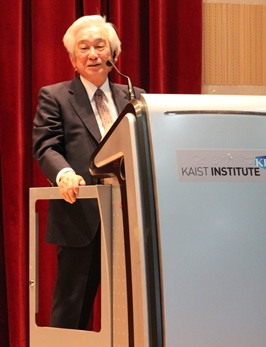On October 2, a special lecture by the 2008 Nobel Physics Prize Laureate Toshihide Maskawa was given in the KAIST Institutes (KI) Building (E4) Fusion Hall on the subject of modern science and society. The lecture was also accompanied with President of Nagoya University Michinari Hamaguchi’s introductory speech.
Doctor Maskawa is a Japanese theoretical physicist and Director General of Kobayashi-Maskawa Institute for the Origin of Particles and Universe at Nagoya University. He is known for his work on charge parity (CP)-violation and was awarded the 2008 Nobel Prize in Physics for the discovery of the origin of broken symmetry, which predicts the existence of at least three families of quarks in nature.

Doctor Maskawa gave an introductory insight on the development of modern physics, and the necessity and challenges of realizing it in modern society. The lecture gave a brief outline of how early physicists of the 20th century paved a path to modern particle physics. From Roentgen’s discovery of x-rays to Einstein’s special general relativity theory, they can all be connected to a modern physics theory through the mathematical works by Lorentz.
The Nobel Laureate remarked on the current state of modern physics by mentioning the collaborative efforts by scientists and the use of big science as a tool to further the frontiers of this field. “Teams of thousands studying particle physics are needed to publish a five-page paper. Thousands of names are written on these research papers, and evaluation is riddled with conflict. We came up with a good way to settle this conflict by writing [the names] in alphabetical order,” mentioned Doctor Maskawa wittily. He also introduced huge particle accelerators used to test the particle physics theory by colliding particles at extreme velocities to simulate the early universe near the time of the Big Bang.
High priority on interdisciplinary learning was raised in this lecture. “Isolation of science” was a term used by Doctor Maskawa to describe the phenomena that occurs as science becomes harder to understand for the general public. “We need to dig deeper into one’s field of study as well as other fields to some extent,” remarked Doctor Maskawa.
Shin Hum Cho
shinhum@gmail.com

